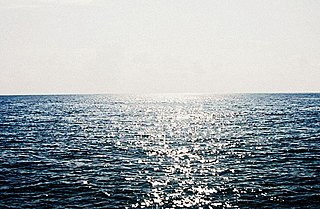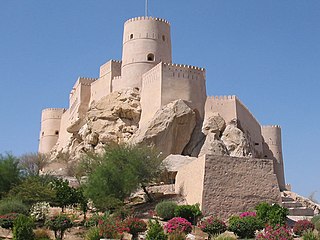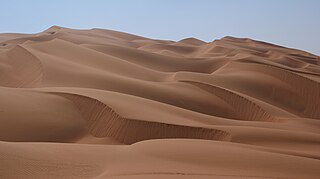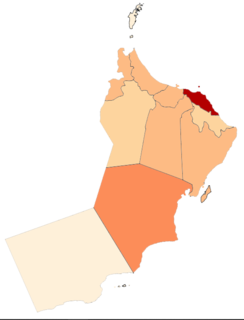Related Research Articles

The Arabian Sea is a region of the northern Indian Ocean bounded on the north by Pakistan, Iran, and the Gulf of Oman, on the west by the Gulf of Aden, Guardafui Channel and the Arabian Peninsula, on the southeast by the Laccadive Sea, on the southwest by the Somali Sea, and on the east by India. Its total area is 3,862,000 km2 (1,491,000 sq mi) and its maximum depth is 4,652 meters (15,262 ft). The Gulf of Aden in the west connects the Arabian Sea to the Red Sea through the strait of Bab-el-Mandeb, and the Gulf of Oman is in the northwest, connecting it to the Persian Gulf.

The Gulf of Oman or Sea of Oman is a gulf that connects the Arabian Sea with the Strait of Hormuz, which then runs to the Persian Gulf. It borders Iran and Pakistan on the north, Oman on the south, and the United Arab Emirates on the west And in some countries it is known as Makran Sea.

Oman, officially the Sultanate of Oman, is a country on the southeastern coast of the Arabian Peninsula in Western Asia and the oldest independent state in the Arab world. Located in a strategically important position at the mouth of the Persian Gulf, the country shares land borders with the United Arab Emirates to the northwest, Saudi Arabia to the west, and Yemen to the southwest, and shares marine borders with Iran and Pakistan. The coast is formed by the Arabian Sea on the southeast and the Gulf of Oman on the northeast. The Madha and Musandam exclaves are surrounded by the UAE on their land borders, with the Strait of Hormuz and the Gulf of Oman forming Musandam's coastal boundaries.

Oman is the site of pre-historic human habitation, stretching back over 100,000 years. The region was impacted by powerful invaders, including other Arab tribes, Portugal and Britain. Oman once possessed the island of Zanzibar, on the east coast of Africa as a colony.
This article is about transport in Oman.

Muscat is the capital city and is the most populated city in Oman. It is the seat of the Governorate of Muscat. According to the National Centre for Statistics and Information (NCSI), the total population of Muscat Governorate was 1.4 million as of September 2018. The metropolitan area spans approximately 3,500 km2 (1,400 sq mi) and includes six provinces called wilayat. Known since the early 1st century AD as an important trading port between the west and the east, Muscat was ruled by various indigenous tribes as well as foreign powers such as the Persians, the Portuguese Empire, the Iberian Union and the Ottoman Empire at various points in its history. A regional military power in the 18th century, Muscat's influence extended as far as East Africa and Zanzibar. As an important port-town in the Gulf of Oman, Muscat attracted foreign tradesmen and settlers such as the Persians and the Balochis. Since the ascension of Qaboos bin Said as Sultan of Oman in 1970, Muscat has experienced rapid infrastructural development that has led to the growth of a vibrant economy and a multi-ethnic society. Muscat is termed as a Beta - Global City by the Globalization and World Cities Research Network.

The Rub' al Khali, the "Empty Quarter") is the sand desert (erg) encompassing most of the southern third of the Arabian Peninsula. The desert covers some 650,000 km2 (250,000 sq mi) including parts of Saudi Arabia, Oman, the United Arab Emirates, and Yemen. It is part of the larger Arabian Desert.

Qaboos bin Said Al Said was the Sultan of Oman from 23 July 1970 until his death. A fifteenth-generation descendant of the founder of the House of Al Said, he was the longest-serving leader in the Middle East and Arab world at the time of his death.
The Ibadi movement, is a school of Islam dominant in Oman. It also exists in parts of Algeria, Tunisia, Libya and East Africa. Modern historians trace the origins of the denomination to a moderate current of the Khawarij movement; contemporary Ibāḍīs strongly object to being classified as Kharijites, although they recognize that their movement originated with the Kharijite secession of 657 CE.

Al-Wasik Billah al-Majid Sheikh Taimur bin Faisal bin Turki, KCIE, CSI was the sultan of Muscat and Oman from 5 October 1913 to 10 February 1932. He was born at Muscat and succeeded his father Faisal bin Turki, Sultan of Muscat and Oman as Sultan.

Khasab is a city in an exclave of Oman bordering the United Arab Emirates. It is the local capital of the Musandam Governorate, and has frequently been dubbed the "Norway of Arabia" because of its extensive fjord-like craggy inlets and desolate mountainscapes.

Nizwa is the largest city in Ad Dakhiliyah Region in Oman and was the capital of Oman proper. Nizwa is about 140 km (87 mi) from Muscat. The population is estimated at around 72,000 people, including the two areas of Burkat Al Mooz and Al-Jabel Al-Akhdar.

The Sultanate of Muscat and Oman also known briefly as the State of Muscat and Oman under the rule of Timur ibn Faisal. A sovereign state that encompassed the present-day Sultanate of Oman and parts of present-day United Arab Emirates and Gwadar, Pakistan, in the second half of the 19th century and 20th century. Ruled by the Al Busaid monarchs, it was established as a result of the partition of the Omani empire upon the death of its last ruler Said ibn Sultan of the Al Busaid dynasty. The Sultanate transitioned into a new for of government after the palace coup of 23 July 1970 in which the sultan Said ibn Timur was immediately deposed in favor of his son Qaboos ibn Said.

The House of Al Said is the ruling royal house of the Sultanate of Oman, and former ruling royal house of the Sultanate of Muscat and Zanzibar and the Sultanate of Zanzibar.

Qatari literature traces its origins back to the 19th century. Originally, written poetry was the most common form of expression, but poetry later fell out of favor after Qatar began reaping the profits from oil exports in the mid-20th century and many Qataris abandoned their Bedouin traditions in favor of more urban lifestyles.

The COVID-19 pandemic in Oman is part of the worldwide pandemic of coronavirus disease 2019 caused by severe acute respiratory syndrome coronavirus 2. The virus was confirmed to have reached Oman on 24 February 2020 when two citizens tested positive for COVID-19 after returning from Iran. As of 20 July, the total number of cases registered in the sultanate is 68,400, of which above 60%; 45,150 cases have recovered and 326 have died. Initially, the majority of the cases and deaths occurred in the expatriate community. By July, as the pandemic entered its fourth month in the country, the majority of the cases and deaths had occurred among the citizens.
Huda Hamed is an Omani writer and journalist who was born on 1981. She published five collections of short stories and four novels. In 2009, her short story collection "Things Are Not Where They Should Be" won the Sharjah Award for Arab Creativity and Best Omani Publication.
Mahmoud al-Rahbi is an Omani novelist and storyteller who was born in 1969. He is the author of over seven story collections including ‘A Swing Over Two Periods of Time’ which ranked in the top position in ‘The Cultural Dubai Award’ in 2009, and ‘Noon Hour’ which won ‘Sultan Qaboos Award for Culture, Arts, and Literature’ in 2012. He, as well, has published four novels including ‘The Stranger’s Leaves’.
Hussein al-Abri, an Omani writer of short stories and novels, born in 1972. He is a psychiatrist and works at the General psychiatric Hospital in Muscat. Abri has published 5 novels, short stories and numerous articles. He won the "Beirut 39" festival of Hay Festival Foundation in cooperation with the Lebanese Ministry of Culture 2009.
References
- ↑ B. Michalak-Pikulska (2002). "Social, Historical and Political Subjects in the Modern Omani Short Story". Studies in Arabic and Islam: Proceedings of the 19th Congress : Halle 1998. Peeters Publishers. p. 249. ISBN 978-90-429-1120-8.
| | This article about an Omani writer is a stub. You can help Wikipedia by expanding it. |